David Cameron
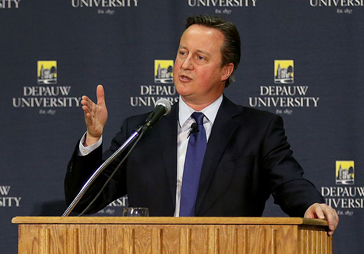 "In spite of all the difficulties of the world that we live in, we should approach them with confidence in our values," David Cameron, the former Prime Minister of the United Kingdom, told an audience at DePauw University today. He identified them as the "values of democracy, values of market economics, values that have undoubtedly improved the world and our countries' place within it."
"In spite of all the difficulties of the world that we live in, we should approach them with confidence in our values," David Cameron, the former Prime Minister of the United Kingdom, told an audience at DePauw University today. He identified them as the "values of democracy, values of market economics, values that have undoubtedly improved the world and our countries' place within it."
A guest of DePauw's Timothy and Sharon Ubben Lecture Series, Cameron spoke to more than 2,000 people in Neal Fieldhouse, located within the Lilly Physical Education and Recreation Center. Among those on hand for the event -- Cameron's first public address since leaving office -- were members of the British news media.
Referencing the title of his speech, "The Historic Events of 2016 and Where We Go From Here," Cameron said, "Obviously the first question that you ask in response to that is how on earth did we get here?"
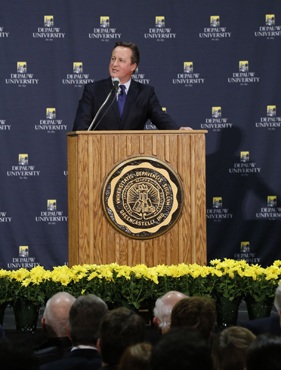 The man who led the United Kingdom for six years believes that while globalization has enhanced the lives of many of the world's citizens, "there are many people in our ow countries who feel, rightly, economically left behind through globalization. Wages at the very bottom have been stagnant or worse, people haven't seen the increase in living standards that they've expected."
The man who led the United Kingdom for six years believes that while globalization has enhanced the lives of many of the world's citizens, "there are many people in our ow countries who feel, rightly, economically left behind through globalization. Wages at the very bottom have been stagnant or worse, people haven't seen the increase in living standards that they've expected."
Cameron also sees a "cultural phenomenon" that has contributed to the political headwinds that shifted this year. "In some of our countries the pace of change has been too fast for people to keep up with. People are concerned that the country that they're living in is not the country that they were born into, and they see that change as happening too quickly.
"And I say this as someone who is pro-globalization, pro-immigration, pro-market economics, but we have to understand these two phenomenon and make a major course correction if we're going to keep on the path to a successful globalization from which we can all benefit."
He continued, "If we don't address the problem of those who are economically left behind we open up our politics to the parties of the extreme left. And if we don't address concerns about the pace of cultural change we open up our politics to parties of the extreme right. And I don't want to see either of those things happen, and I'm optimistic and confident because I believe we do know the answers to both of these problems."
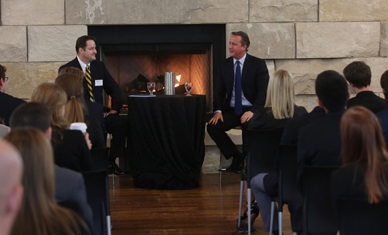 Cameron served as Prime Minister from May 2010 until this July. He is credited with modernizing the Conservative Party and his administration introduced significant changes to welfare, immigration policy, education, and healthcare, legalized same-sex marriage and privatized the Royal Mail and other state assets. He announced he would resign his post on June 24, a day after voters decided in a referendum that the United Kingdom should withdraw from membership in the European Union (commonly referred to as "Brexit").
Cameron served as Prime Minister from May 2010 until this July. He is credited with modernizing the Conservative Party and his administration introduced significant changes to welfare, immigration policy, education, and healthcare, legalized same-sex marriage and privatized the Royal Mail and other state assets. He announced he would resign his post on June 24, a day after voters decided in a referendum that the United Kingdom should withdraw from membership in the European Union (commonly referred to as "Brexit").
"Does the Brexit vote and the election of your new president mean somehow an end to globalization?," Cameron asked the 2,200 people in the audience. "Is the movement toward greater trade, greater cooperation, greater specialization, global growth with all those post-war institutions, is that era coming to an end? And I would say very clearly, no. It's not just that the benefits of globalization are still so clear ... you have to ask yourself if it really would be in the interests of the United States, the greatest and most powerful country on earth, to go down a protectionist route. And my answer is, of course, it would be absolutely against your interests."
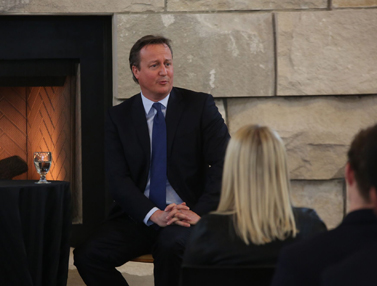 The former Prime Minister says the U.S. is a global leader in industries that are poised to lead the way in the next century -- including genetics, robotics and medicine. "And if you started to protect existing industries against others, others would start to protect against you."
The former Prime Minister says the U.S. is a global leader in industries that are poised to lead the way in the next century -- including genetics, robotics and medicine. "And if you started to protect existing industries against others, others would start to protect against you."
The sixth Prime Minister of the United Kingdom to visit DePauw, David Cameron's first stop was the University's Prindle Institute for Ethics, where he took questions from students in a forum led by Robert F. Dewey, associate professor of political science.
His speech at Neal Fieldhouse was followed by a question-and-answer session. The queries -- which were submitted by students, faculty, staff, alumni and others via email -- were presented to the Prime Minister by three DePauw student journalists.
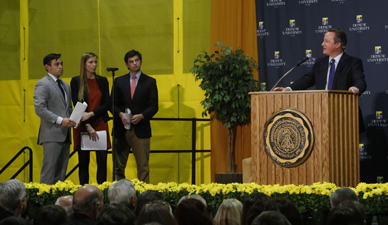 "I stand here as a great optimist about how we can combat populism," Cameron stated, adding, "I'm not saying that I've suddenly started to believe that Brexit is the right answer for Britain. I still believe that we would have been better off had we voted to stay. I haven't suddenly started to believe that all of things that President-elect Trump said in his campaign were somehow the right answer for America, or the world ... The task of modern political leadership is not to complain about the circumstances that you find yourself in, but to try to turn them to your advantage, to try to make what I believe is necessary, which is a course correction to our politics and to our approach to economics to make sure that the great benefits of globalization can continue. And that is what needs to happen today."
"I stand here as a great optimist about how we can combat populism," Cameron stated, adding, "I'm not saying that I've suddenly started to believe that Brexit is the right answer for Britain. I still believe that we would have been better off had we voted to stay. I haven't suddenly started to believe that all of things that President-elect Trump said in his campaign were somehow the right answer for America, or the world ... The task of modern political leadership is not to complain about the circumstances that you find yourself in, but to try to turn them to your advantage, to try to make what I believe is necessary, which is a course correction to our politics and to our approach to economics to make sure that the great benefits of globalization can continue. And that is what needs to happen today."
Cameron acknowledged "it is easy to be depressed" by today's world situation, with terrorism and extremism, a seemingly endless war in Syria, and tepid economic growth, among other issues.
"But it is worth just pausing for a second, because I stand here tonight as a great optimist about our future prospects. And it's worth standing back and focusing for a second not on 2016, but on what we have achieved over the last two decades."
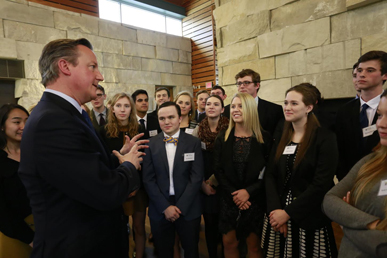 Poverty worldwide has declined, and medicine has nearly eradicate polio and promises to eliminate other deadly diseases, noted Cameron. "It's a time of enormous technological change that promises to improve our lives and help change the way we live ... We may not entirely approve of the outcome of all of the elections or even referendums that take place in our world, but we can't be in any doubt that democracy itself is on the march."
Poverty worldwide has declined, and medicine has nearly eradicate polio and promises to eliminate other deadly diseases, noted Cameron. "It's a time of enormous technological change that promises to improve our lives and help change the way we live ... We may not entirely approve of the outcome of all of the elections or even referendums that take place in our world, but we can't be in any doubt that democracy itself is on the march."
There were a dozen democracies in the entire world in 1942; there are over 100 today.
"One of the greatest lessons that I learned was the strength of this partnership between Britain and the United States of America. I'd always believed in it, I'd always hoped for it, but it was only as Prime Minister that I could see that whether we fighting for stronger economic growth, whether we trying to defeat terrorism, whether we were standing up to Russia, there are no better friends, no closer relationships, than that between Britain and the United States of America."
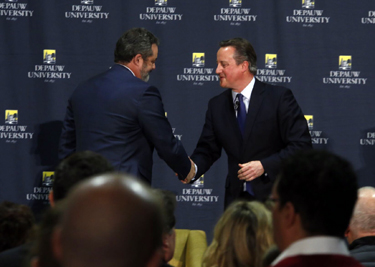 Cameron took the stage as a brand new musical piece, Fanfare for David Cameron, written for the occasion by DePauw School of Music Professor Orcenith Smith, was played by student musicians.
Cameron took the stage as a brand new musical piece, Fanfare for David Cameron, written for the occasion by DePauw School of Music Professor Orcenith Smith, was played by student musicians.
"I've never been introduced with an anthem," Cameron joked.
"It's great to be here at DePauw," he stated as he began his remarks. "I'm a huge fan of your university system, of the amazing enthusiasm I always see from people at your great schools and the huge potential that they represent."
The Prime Minister, who attended a college basketball game in Texas last night with former President George W. Bush, said, "As I'm here at DePauw, let me congratulate you on bringing home the Monon Bell," to cheers from the crowd.
"Now I've heard about your other tradition -- what happens when the snow starts to fall for the first time," Cameron said as the audience laughed. He was, of course, referring to "Boulder Runs," in which undergraduates celebrate the arrival of winter weather with a streak past the Columbian Boulder which sits outside of historic East College. As traces of snow fell outside, Cameron noted, "I'm a careful sort of guy and I check the weather forecast, I looked up into the sky and I think I'm going to be leaving town tonight."
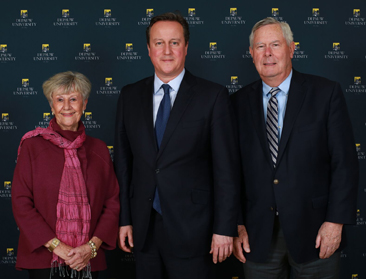 Cameron also thanked Tim and Sharon Ubben, the two 1958 graduates whose gift 30 years ago endowed the lecture series that presented this event, and more than 100 others.
Cameron also thanked Tim and Sharon Ubben, the two 1958 graduates whose gift 30 years ago endowed the lecture series that presented this event, and more than 100 others.
"I am enormously impressed with the philanthropy that you have in the United States," said Cameron. "And it goes to a big truth about our world today. If we want to build a better world, but we don't want an endlessly bigger government, we need to build that big society; we need people to stand up and put in and contribute to their communities, as the Ubbens have here at DePauw University."
He received several standing ovations.